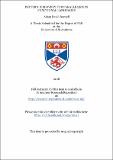Pattern discovery for parallelism in functional languages
Abstract
No longer the preserve of specialist hardware, parallel devices
are now ubiquitous. Pattern-based approaches to parallelism,
such as algorithmic skeletons, simplify traditional low-level
approaches by presenting composable high-level patterns of
parallelism to the programmer. This allows optimal parallel
configurations to be derived automatically, and facilitates the
use of different parallel architectures. Moreover, parallel patterns
can be swap-replaced for sequential recursion schemes,
thus simplifying their introduction. Unfortunately, there is no
guarantee that recursion schemes are present in all functional
programs. Automatic pattern discovery techniques can be used
to discover recursion schemes. Current approaches are limited
by both the range of analysable functions, and by the range of
discoverable patterns. In this thesis, we present an approach
based on program slicing techniques that facilitates the analysis
of a wider range of explicitly recursive functions. We then
present an approach using anti-unification that expands the
range of discoverable patterns. In particular, this approach is
user-extensible; i.e. patterns developed by the programmer can
be discovered without significant effort. We present prototype
implementations of both approaches, and evaluate them on
a range of examples, including five parallel benchmarks and
functions from the Haskell Prelude. We achieve maximum
speedups of 32.93x on our 28-core hyperthreaded experimental
machine for our parallel benchmarks, demonstrating
that our approaches can discover patterns that produce good
parallel speedups. Together, the approaches presented in this
thesis enable the discovery of more loci of potential parallelism
in pure functional programs than currently possible.
This leads to more possibilities for parallelism, and so more
possibilities to take advantage of the potential performance
gains that heterogeneous parallel systems present.
Type
Thesis, PhD Doctor of Philosophy
Collections
Items in the St Andrews Research Repository are protected by copyright, with all rights reserved, unless otherwise indicated.

